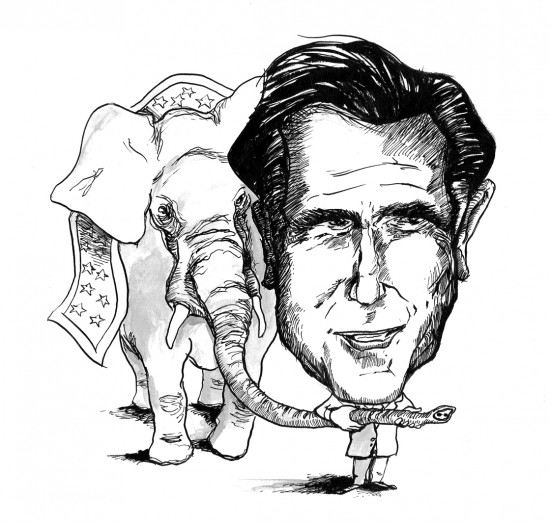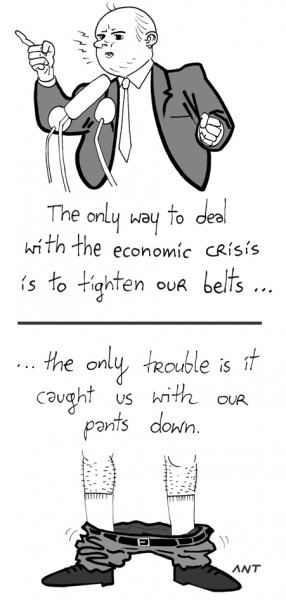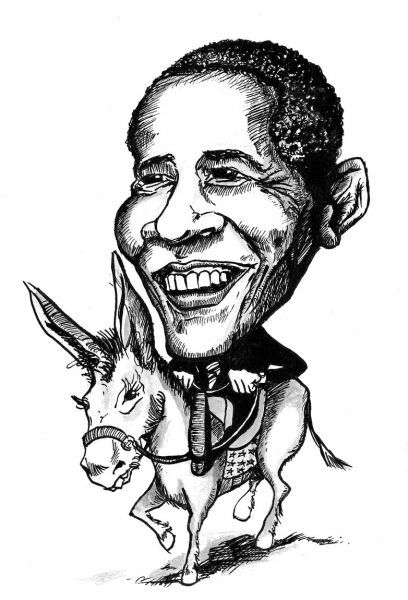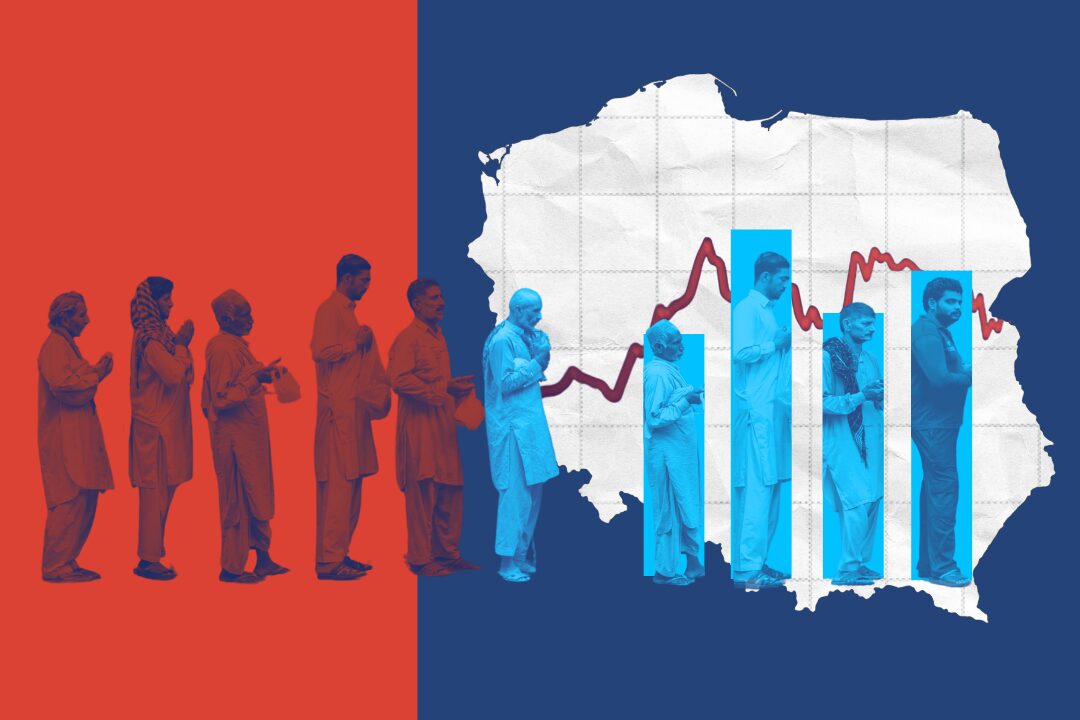[ wersja polska / Polish version ]
Ladies and Gentlemen!
Americans elect their president, but even a few hours before the election no one knows who of the two candidates will emerge victorious. “America deserves someone better than Obama, but Romney fails to meet this challenge” – wrote the editors in the last issue of “The Economist”, and ultimately expressed their support for the current president. Many other influential media has done the same, among others “The Washington Post”, “The New York Times” and “The New Yorker”. Is this a good choice?
“Kultura Liberalna” has followed the American elections for over a year and we did not conceal that our sympathies also lie with the candidate of the Democratic Party. Four years after the historic victory, Obama no longer evokes similar enthusiasm, but his liberal conception of politics is still more convincing than the one proposed by the Republican challenger.
In the current issue of “Kultura Liberalna” in order to summarize the events of recent months, we asked four eminent intellectuals to analyse selected aspects of U.S. political life and explain how they could be affected by one or the other election result.
Political scientist Benjamin Barber, although gives his vote to Obama, does not conceal his scepticism about the president’s record so far. When discussing the Republican Party, Barber claims that under the influence of right-wing radicals, the GOP has become a party of an already disappearing “white, protestant, poor and rural” America, while the new society “is primarily urban, multiethnic, and multidenominational.”

Sunil Khilnani, director of the Indian Institute of King’s College in London, is also convinced that as far as foreign policy is concerned the differences between the two politicians are hardly significant. Analyzing their policy proposals on India – which do not come up in American political debates anywhere near as often as China – he explains why from the point of view of strictly bilateral, Indo-American relations, “it’s a wash between the two candidates”.
Finally, in the last piece, we ask Martin Wolf, chief economics commentator at “Financial Times”, about the consequences victory of one or the other candidate could have for American and world economy. Wolf, who in the 1980s was quite happy to see Ronald Reagan as president, today does not conceal his disappointment with the Republican Party and criticizes Mitt Romney’s economic proposals.
Enjoy your reading!
Łukasz Pawłowski
1. BENJAMIN BARBER: Obama won’t win. But don’t worry, Romney will lose
2. ANNE APPLEBAUM: Romney alike Obama, Obama alike Bush
3. SUNIL KHILNANI: Obama, Romney, India
4. MARTIN WOLF: Pragmatic Obama and unpredictable Romney
Benjamin Barber interviewed by Łukasz Pawłowski
Obama won’t win. But don’t worry, Romney will lose
Political scientist Benjamin Barber in an interview with Łukasz Pawłowski on the American presidential election, future of the Tea Party and Mitt Romney’s uniqueness.
Łukasz Pawłowski: Your political inclinations are widely known, so I assume you don’t have trouble naming your candidate in the forthcoming election?
Benjamin Barber: What are my political inclinations?
Liberal and progressive…
That is true, but does is it make me pro-Obama? Will I vote for him? Yes. Do I think he’s a progressive and liberal? No. Am I his whole-hearted supporter? No.
Were you four years ago?
No.
Why?
Because his record before 2008 was quite clear. Anyone who took time to verify it knew immediately that senator Obama is a market centrist, who will never confront Wall Street and truly change American politics. He’s a Harvard educated technocrat, not a liberal progressive.
Nevertheless, as many other people dissatisfied with Barack Obama’s presidency, you are not even considering voting for the Republican Party. Why do you think it ceased to be a real alternative even for those disappointed with the incumbent president’s policies?
Because it has been completely taken over by the Tea Party extremists, who refuse to make any compromises and will not engage in any bipartisan bargaining.
What, however, will happen to this faction, if Mitt Romney and Paul Ryan lose the elections?
In all probability they will lose, but even leaving this aside I think the Tea Party is finished, because in demographic terms it represents the past. The reason for their anger and radicalism is that they are the face of an already disappearing America – white, protestant, poor and rural. The new America is primarily urban, multiethnic, and multidenominational. There is nothing that can reverse this change, yet the Republican Party keeps on ignoring it. It is enough to look at the parties’ national conventions to see how different Republicans and Democrats have become. Never mind what was said at the podium, let’s just look at the public. At the GOP convention they had to parade people of colour on stage, because there weren’t enough of them in the audience. At the Democratic one, about a half or one third of all delegates were people of colour. This is an adequate image of contemporary America.
* Benjamin R. Barber, political theorist, Senior Research Scholar at The Center on Philanthropy and Civil Society at the City University of New York, President and Founder of the Interdependence Movement. Barber’s 17 books include “Strong Democracy”; the international best-seller “Jihad vs. McWorld” and most recently ‘Consumed: How Markets Corrupt Children, Infantilize Adults, and Swallow Citizens Whole’. His upcoming book, “If Mayors Ruled the World”, will be published by Yale University Press in 2013.
** Łukasz Pawłowski, contributing editor for ‘Kultura Liberalna’, PhD candidate at the Institute of Sociology, University of Warsaw, currently an academic visitor at the Department of Politics and International Relations, University of Oxford.
***
Anne Applebaum interviewed by Łukasz Pawłowski
Romney alike Obama, Obama alike Bush
American journalist and author, Anne Applebaum, on U.S. foreign policy, differences between Barack Obama and Mitt Romney and the limits of presidential power.
Łukasz Pawłowski: How would American foreign policy change if Mitt Romney was elected president?
Anne Applebaum: The difficulty in judging Romney is that even at the end of the campaign we don’t really know what his foreign policy would be. He has changed his advisers several times: those working on his campaign are quite different from those in his proposed ‘transition team’. Romney has also used different types of language at different times. Sometimes he sounds very hawkish and criticizes Obama very loudly for not pushing a more aggressive agenda. But when, during one of the presidential debates, he was asked about concrete polices, he sounded very similar to those of Obama. There might be different rhetoric if he were president, but not much more.

Let’s remember that every American president is very much constrained in his actions – especially in foreign policy – by circumstances, by budgets and by previously made commitments. People tend to focus on the presidential race so much because it’s more exciting and easier to follow than congressional elections, for example, and so they tend to talk as if it really mattered. But it’s far from clear that American foreign policy with Romney in power would be much different from what it is right now.
Well, I see at least two ways in how it might be different. First, Romney promised to increase military spending to 4 per cent of the GDP which might have significant consequences for American engagement overseas.
Yes, but Romney doesn’t have the money for that, so he would not be able to do it. It’s just talk.
Let’s move to a second major difference then. It is often said that Obama’s administration in the last four years has been trying to get out of the Middle East and to focus their policy on the Far East. Secretary Clinton traveled to this region on many occasions and tried to create a coalition comprised of such countries as Japan, Thailand, and Indonesia which would surround China and thus offset the Chinese power in this part of the world. I think Mitt Romney’s administration could undo that if they decided to focus back on the Middle East.
Do you think America has really gotten out of the Middle East?
Obviously not but there are differences in emphasis the president might put on different aspects of foreign policy which in turn have substantive consequences.
I don’t think there is much room for maneuver in this respect. No matter who the president is he will have to honor the commitments already made. If Romney became president, he would still have troops in Afghanistan, serious obligations and responsibilities in Iraq and deep, complicated relationships with Israel, Saudi Arabia and others. These are immovable pieces of the puzzle that are not easily changed.
* Anne Applebaum is an American journalist and author, columnist for the ‘Washington Post’ and the Director of Political Studies at the Legatum Institute in London. In 2004 she was awarded the non-fiction Pulitzer Prize for ‘Gulag: A History’. Her latest book, ‘Iron Curtain: The Crushing of Eastern Europe, 1944-1956’, published in October 2012, was nominated to this year’s National Book Award.
***
Obama, Romney, India
If one were to judge by the campaign debate on foreign policy between President Obama and Governor Romney held a few weeks ago, there is very little to separate the two candidates when it comes to U.S. international policy. Indeed, which it comes to India – which was not mentioned once during the debate – one might think we are back in an era when the U.S. and India preferred to ignore each other. In fact, despite the rhetorical attacks on outsourcing by both candidates during their campaigns, India remains for the U.S. an important area of strategic initiative. This is especially so in light of America’s ‘pivot to Asia’, but equally because India will have to play a role in the containment of Pakistan and in achieving whatever stabilization may be possible in Afghanistan. On the economic front too, India signifies for America, and for the growth prospects of American companies and industries. India’s need for massive infrastructure investment, its vast retail consumer market, and its relatively cheap technically skilled and intellectual equipped labour force, all make it a very attractive destination for U.S. investment and economic engagement.
The great breakthrough in the U.S.-India relationship occurred during the presidency of George W. Bush: his India policy was the one singular success of what otherwise was a series of foreign policy fiascos. However, the warmth generated by the Indo-U.S. Civil Nuclear agreement of 2008 cooled somewhat during the Obama presidency. Obama has had a wooden ear for Indian sensitivities: when in Beijing in 2009, he spoke of China playing a role in South Asia and seemed to suggest the possibility of a U.S.-China G-2 emerging, both prospects abhorrent to India. In general, his administration adopted a more transactional attitude in America’s relationship to India, unlike the Bush administration’s explicitly strategic perspective. Although Obama visited to India in 2010, Indians only really embraced a more positive image of the President after the raid on Abbotabad that killed Osama bin Laden, and after Obama made clear that he would pursue a more stringent policy towards Pakistan. For Indians, this showed that finally the American leadership had realized what Indians had professed to know all along – the duplicity of Pakistan’s leadership.
Romney’s views on India are unclear – it’s not a subject he has spoken much about, nor has he ever visited the country. While he can count among his foreign policy advisors on the region some of the most knowledgeable in Washington, it’s not evident that Romney himself has a larger perspective on India, and on India’s role in Asia and the world. While he might be more aggressive on matters to do with China, he’s likely to be more cautious when it comes to Pakistan.
Over the next five years, three issues will be critical for India: a stable regional neighbourhood, which will not be damaged by internal turmoil in Pakistan or Afghanistan; increased foreign investment in India in order to keep growth rates high; and keeping the global economy open and unfettered by protectionist measures. It’s not evident that either Obama or Romney have very distinctive approaches to any of these issues. So, on balance, from the point of view of strictly bilateral interests, it’s a wash between the two candidates. However, when it comes to the wider conduct of U.S. policy across the globe – and India will inevitably feel the effects of such policies – then Obama does seem to be the more prudent figure, less likely to stumble into traps.
* Sunil Khilnani, Avantha Professor and Director of the India Institute at King’s College London.
***
Martin Wolf interviewed by Łukasz Pawłowski
Pragmatic Obama and unpredictable Romney
Martin Wolf, chief economic correspondent at the Financial Times, on the impact of the presidential election on American economy, disappointment with Obama’s stimulus and irresponsibility of Mitt Romney’s proposals.
Łukasz Pawłowski: What will be the economic consequences of the American presidential election? In what kind of shape will the the American economy be in 2017 under four more years of Barack Obama, or four years of Mitt Romney?
Martin Wolf: It is an incredibly difficult question to answer, because there are many things we cannot possibly predict. Let’s start, however, with what I think will be happening to the American economy regardless of the election outcome and policy choices that will be made. Even if we leave aside the elections and politics, the economy is still there.
It seems plausible to argue that the majority of the post-crisis adjustment is now completed: there has been a very substantial amount of deleveraging in the financial sector and the household sector; the non-financial corporate sector is in reasonable shape; the monetary policy is very expansionary and will most likely remain so; the budgets of local and state governments have been already slashed enough, which is important because the reduction in fiscal deficits of state and local governments has been a very big drag on economic activity over the last two years. If all that is in place and GDP starts moving at about 3 per cent, then you might see quite a lot of investment. That, in turn, could lead to a virtuous circle and strong cyclical recovery.

There is an immediate challenge, the so-called ‘fiscal cliff’ [1]. I assume that if Romney is elected and the Republicans hold the House of Representatives, they will agree to slash taxes and spending while maintaining all tax breaks. Their only problem will be to get that proposition through the Senate, where they probably won’t have the necessary majority. If Obama is re-elected but the Republicans hold the House of Representatives, then reaching a deal may be even more difficult, because the GOP will not accept any tax increases. Either way there is a serious risk of a great fiscal contraction, which would throw the economy back into recession.
Despite all the favourable trends you described before?
Yes, because fiscal contraction is about 4 per cent of GDP. It’s so large that it’s very difficult to imagine that it would not put the economy into recession.
How does it affect Mitt Romney’s promise that as a president he would balance the American budget?
I don’t believe he would. Romney’s fiscal policy would be more expansionary and produce larger deficits. He would cut taxes dramatically and then would not be able to offset those with reductions in tax expenditures, for this is impossible without cutting expenditures which are immensely popular. He also wouldn’t be able to reduce governmental spending as much as he promised. Spending on health care and social security cannot be changed rapidly. Along with debt interest and defence spending – which Romney promised to increase by a trillion dollars – they constitute roughly 72 percent of the US federal budget. The other 28 percent would have to be largely eliminated in order to balance those expenses.
* Martin Wolf, is a British journalist and author, chief economics commentator at the Financial Times, and widely regarded as one of the world’s most influential writers on economics. His recent publications are ‘Why Globalization Works’ (2004) and ‘Fixing Global Finance’ (2008).
***
*Concept of the issue: Łukasz Pawłowski
e-mail: [email protected]
**Collaboration: Marta Budkowska, Anna Piekarska, Ewa Serzysko, Jakub Krzeski
***Illustrations: [1 and 2] Janek Żusin, [3,4,5] Execution: Antek Sieczkowski; Concept: Łukasz Pawłowski
Kultura Liberalna nr 200 (45/2012), November 6th 2012








